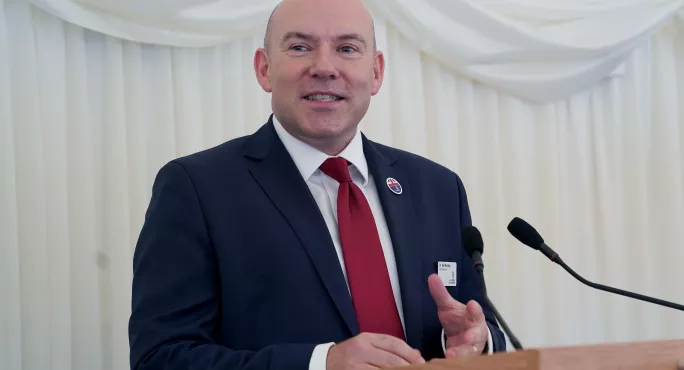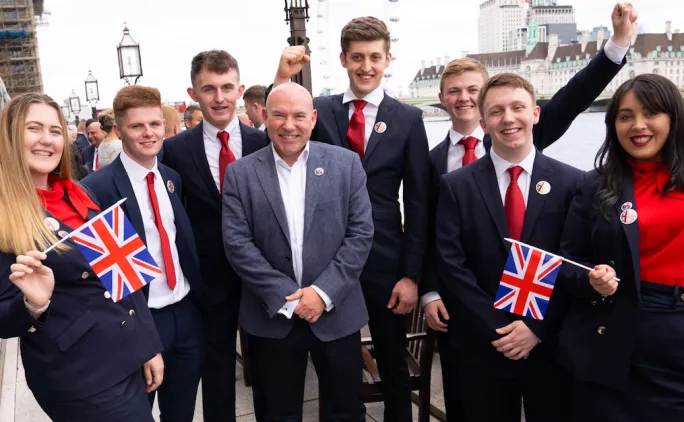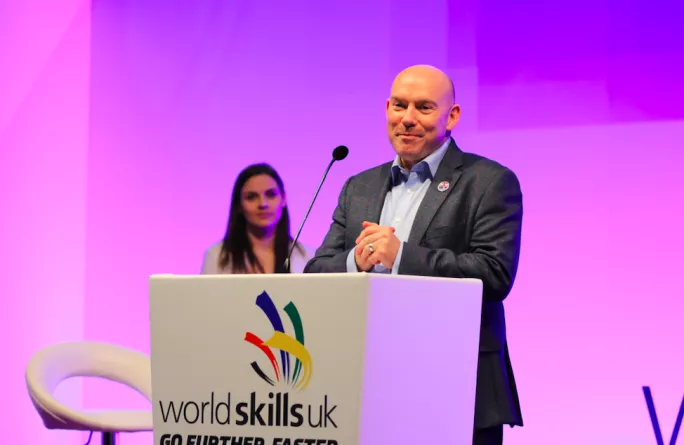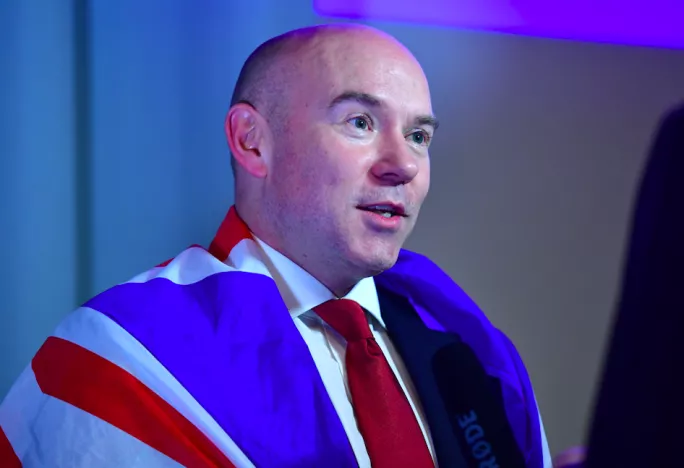- Home
- Meet WorldSkills UK’s CEO: Neil Bentley-Gockmann
Meet WorldSkills UK’s CEO: Neil Bentley-Gockmann

“What was I good at in school? Languages, languages, languages. I just absolutely loved languages. I was quite a shy kid, and through languages I found a way of communicating and a love of other cultures and other countries,” says Neil Bentley-Gockmann.
“I got a sense of a big picture of the world out there, which I wanted to go and explore. I could see that all of these other countries had different ways of doing things – and that got me really excited.”
Decades on from his school days, Bentley-Gockmann’s dreams of exploring the world and discovering other cultures have come true. In his role as chief executive of WorldSkills UK, he is at the forefront of skills development in the UK, working internationally to gain insight and expertise from skills systems right across the globe.
WorldSkills UK Live: Two-day event to take place online
More: WorldSkills UK unveils £1.5m Centre of Excellence
Listen: Neil's podcast
Bentley-Gockmann was born in Belfast at the end of the 1960s. His dad was a process engineer, and his mum stayed at home to look after him, his older brother and younger sister. He says that while he had a very tight-knit, supportive family and a happy childhood, he grew up against “the backdrop of a lot of violence”.
Violence on the streets of Belfast
“It was a time when there was lots of bombings and killings and shootings every day. It feels like ancient history a little bit, but it was my lived experience. In Belfast at the time there was a huge security presence on the streets. Everywhere you went there was security on public transport,” he says.
“I remember going to England for the first time on holiday as a child, going into a shop, and really clearly saying to my mum, ’Why are we not being searched? Where's the security?’ To me that was just what life was like.”
Bentley-Gockmann says that as he grew older, he became “quite energised” about the social injustice and economic disadvantage that were entrenched within his community, and became heavily involved in cross-community activities to tackle the issues.
Bentley-Gockmann says that as he came to the end of his education in Northern Ireland, he realised he needed to “leave in order to succeed” – and decided to move to Wales for university.
“Internationally, things were so different to what Northern Ireland was like at the time. I grew up gay in the 1980s, which was difficult. I needed to leave in order to succeed: I didn't think that I was going to flourish, or meet my potential, staying where I was,” he says.
To begin with, things didn’t quite go to plan. He went to Swansea University to study French, German and business studies but dropped out in the first term. He was going through coming out as gay and struggled being in a very different environment at the same time. He was also the first among his family and friends to go to university – and says he was completely unprepared for the lack of support he received.
He returned home to Belfast for a few months, before going to work in France for six months. He decided to give higher education – and Wales – another shot, and went to Cardiff University to study French, German and European politics the next September.

“The break gave me time to get my head straight about being gay. I remember when I arrived at Cardiff University the first thing I did was join the gay – now LGBT+ – society. At the time, I knew I needed to engage and be part of it and make the most of the opportunity of being in university,” he says.
As part of his degree, Bentley-Gockmann spent a year in Germany teaching English, and when he graduated from Cardiff, he took a job teaching in France.
Following a PhD in Cardiff, he moved to London with his boyfriend (now husband) and got a job as a writer for the European Industrial Relations Review, a monthly trade journal, writing about skills, employment, trade unions and political economics across Europe.
Stepping into skills
A stint at EDS, a global IT services company, followed, before he moved to the CBI as head of employment and skills in 2002. While in the role, he was approached by former WorldSkills president Simon Bartley, who spoke of bidding to host the “skills Olympics” in London. Bentley-Gockmann and the CBI backed the bid – and in 2011, the UK hosted the WorldSkills competition.
Bentley-Gockmann was in London at the time, but never actually went to the competition. “I lost sight of what was going on with WorldSkills, and I really kick myself for it. to be honest,” he says.
He says that he “absolutely loved” his time at the CBI, and had some incredible experiences: he accompanied David Cameron, who was prime minister at the time, to the G20 summit, and visited the White House to discuss environmental issues when Barack Obama was president.
But when he went to Harvard University on a leadership programme, things started to change. "The programme forced you to look at motivation: why did you choose to do this at school? Why don't you do that? What really gets you going? Three things came out of it: education and development, diversity and inclusion and the environment. I really felt that I wanted to make a personal difference as a leader in those areas,” he says.

For months, he was torn between his love for the CBI and his broader desire to make a real difference. He was in Brazil with the CBI on his 45th birthday when he made his mind up.
“We were staying at a hotel on Copacabana beach, and I went to my bedroom after dinner and poured myself a large whisky. I sat there and thought, 'In five years' time, do I still want to be doing this?' I knew immediately that I needed to change something. I wasn't unhappy but I wasn't wildly happy, and I thought, 'I’ve got to take control and make a change,'” he says.
He took some time out of work – and alongside his husband, an architect, designed and built their dream eco-home in the countryside. He was asked to become chief executive for Outstanding, a diversity organisation specialising in LGBT+ leadership development, and shortly after he was headhunted to lead what was then called Find a Future.
“I thought, 'What’s Find a Future? Careers, education, young people, further education – it sounds interesting.' And then the more I looked into it, I realised: this is WorldSkills. I was interviewed, got the job and that was five years ago,” he says.
Life at WorldSkills
Today, Find a Future is known as WorldSkills UK, an organisation that not only hosts competitions and is in charge of the Team UK that competes in international skills competitions, but also pushes the skills agenda across the UK, and shares international expertise to raise standards.
Bentley-Gockmann says it has been a challenging and rewarding journey to make that shift and remembers the moment he “got" the power of WorldSkills.
He says he attended his first WorldSkills competition in Abu Dhabi and the UK national finals only a few weeks later, and he felt "really emotionally connected at a level I've never felt with any job, to be honest".
"I got the intellectual connection, I got what we were trying to achieve, and I got this massive emotional kick,” he says.
“I was making the speech at the opening reception of the skills show and feeling passionate. People came up to me afterwards and said, ‘What’s got into you?’ I just felt so proud. I'm so proud to lead this organisation and I hold on to that feeling.”
Bentley-Gockmann says he sees the difference that WorldSkills UK makes in thousands of young people's lives – and that’s what drives him every day. He says that at the beginning of the coronavirus pandemic, he was in shock, worried about how WorldSkills UK would be able to continue that mission in the same way.
“I just remember thinking, 'If we can't help all of these young people through our work, what are we going to do?'” he says.
“But I guess that's the magic of our team and the partners we work with. Really quickly, we went, 'Right, this is the opportunity we now have to go digital and to accelerate to things we've been talking about for a long time.'”

Earlier this week, WorldSkills UK launched the online version of its skills show, which will take place in mid-November. Bentley-Gockmann says it was a big mindset shift – but that it’s an opportunity to reach even more young people than ever before.
The organisation is also pushing forward on its research work and has recently launched the Centre of Excellence – a partnership scheme with colleges across the UK in which staff will be trained by WorldSkills experts to teach world-class level skills.
“Going forward, it’s all about influencing the driving-up of standards. How can we make sure that our international best practice work can be really brought into the UK skill systems, and how do we embed the methodology that we use for driving up standards through competitions into the system,” he says.
“Everybody needs to understand the world-class methodology, so that colleges and training providers can use it to drive up standards so that more young people are more employable: they've got more confident and have a higher technical skill set, as well as a better mindset to be able go into the labour market.”
And if all goes to plan, Bentley-Gockmann and the Team UK squad will be off to Graz in January to compete in EuroSkills. He admits that Covid-19 has made training difficult – but he is just as determined that the UK will finish in a top 10 spot.
“It’s been challenging, because trainers and competitors haven’t been able to be physically together. But I get a sense that those who are in the team are really dedicated, fired up and ready to go,” he says. “As far as I’m concerned, it’s game on.”
Keep reading for just £1 per month
You've reached your limit of free articles this month. Subscribe for £1 per month for three months and get:
- Unlimited access to all Tes magazine content
- Exclusive subscriber-only stories
- Award-winning email newsletters



